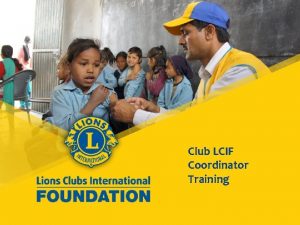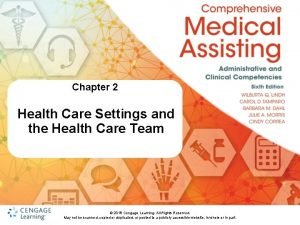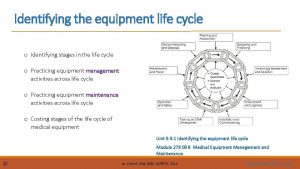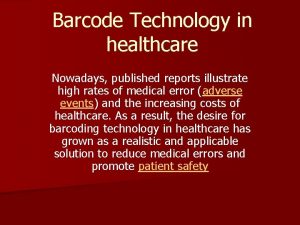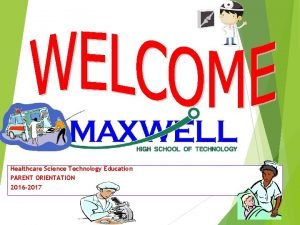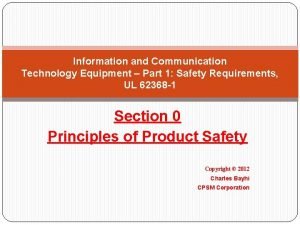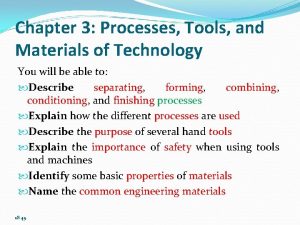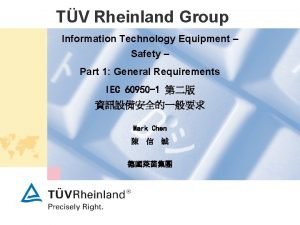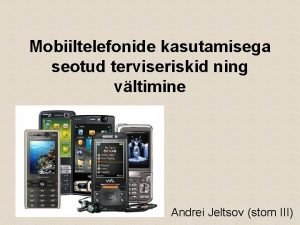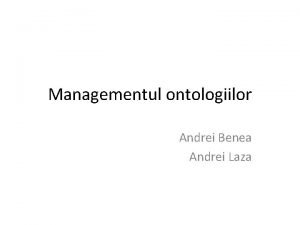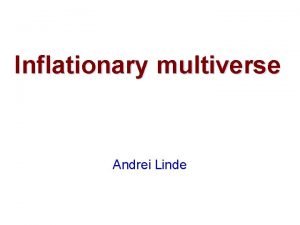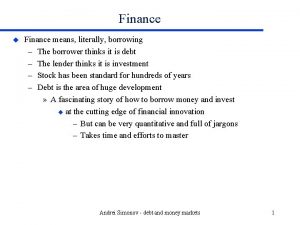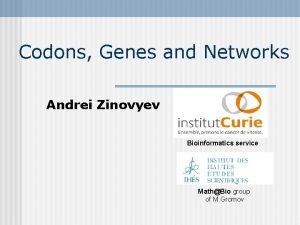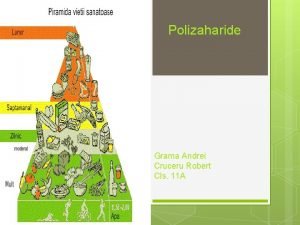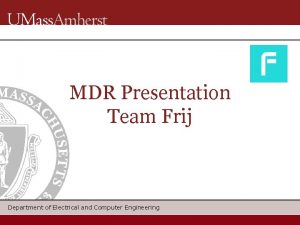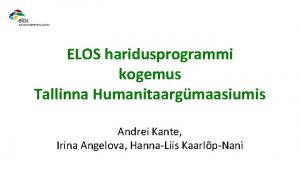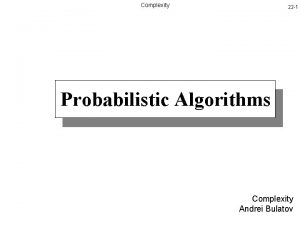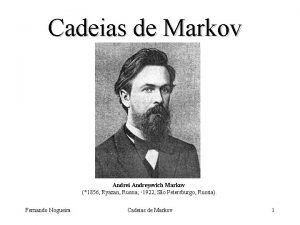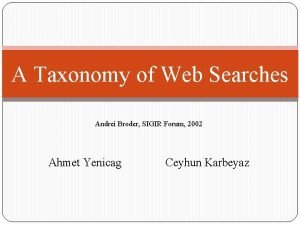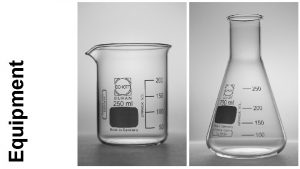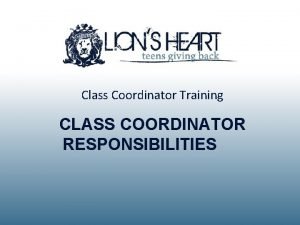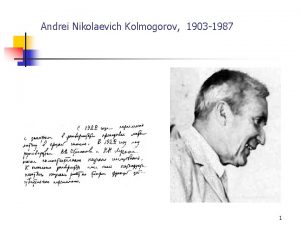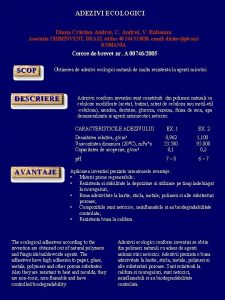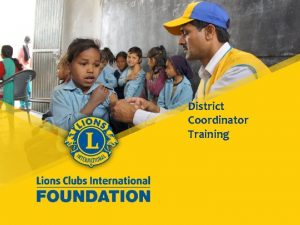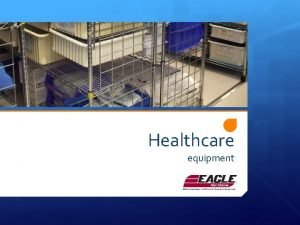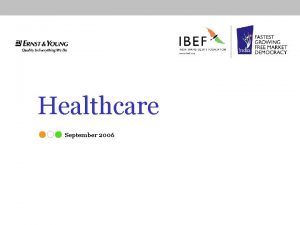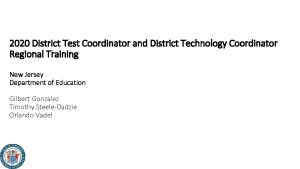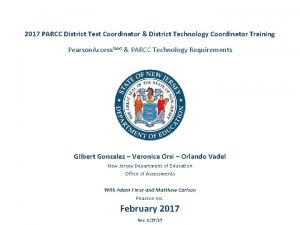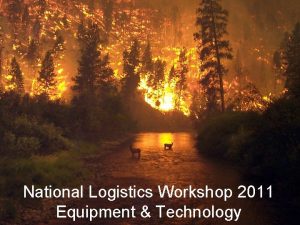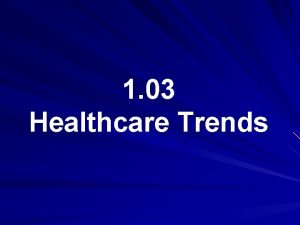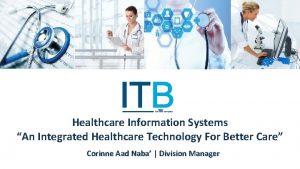Healthcare Equipment Donations Andrei Issakov Coordinator Health Technology




























- Slides: 28

Healthcare Equipment Donations Andrei Issakov Coordinator Health Technology and Facilities Planning and Management Department of Health Policy, Development and Services World Health Organization, Geneva AHTM Workshop, Mombasa, 9 -12 August 2006

Dependence on donors & donations • Economic problems, lack of resources and other health service delivery challenges contribute to increasing dependence on donor assistance • In many developing countries nearly 80% of healthcare equipment is donated or funded by donors • Donor policies greatly influence the pattern of equipment acquisition / procurement AHTM Workshop, Mombasa, 9 -12 August 2006

Donations Reality • Not appropriate for local needs • Not suitable for local conditions, site is not suitably prepared • No expertise available to install or commission it • Staff lack knowledge of how to use it • Parts not specified or delivered • No instruction manuals or their language is not understood • Not supported with consumables • Adequate logistic support is too costly once initial supplies are consumed • Defective on delivery AHTM Workshop, Mombasa, 9 -12 August 2006

Donations Reality • • • Donations by nature “bypass” institutionalized planning Seldom takes health system needs into consideration Supply driven (political, donor …) Often time limited - no long-term vision Recipient not prepared to “absorb” donation AHTM Workshop, Mombasa, 9 -12 August 2006

Who would like to be associated with these donations ? P. Heimann J. Mc. Gill P. Heimann AHTM Workshop, Mombasa, 9 -12 August 2006

Ømatch with health system needs and requirements Need Supply AHTM Workshop, Mombasa, 9 -12 August 2006 Deman d

ØFit into the right mix of technology resource inputs AHTM Workshop, Mombasa, 9 -12 August 2006

ØRelate capital donation to recurrent implications Purchase Price Known Costs Staff Costs Operating Costs Maintenance Costs Training Costs Administration Costs Transportation Costs Cost of information systems Cost of removal from service AHTM Workshop, Mombasa, 9 -12 August 2006 Hidden Costs

Life-cycle cost of equipment AHTM Workshop, Mombasa, 9 -12 August 2006

ØEnsure the capacity to manage donations throughout the life cycle PROVISION Manufacture Marketing Transfer Testing Development Distribution Research Assessment of Needs De-commissioning Technology Assessment Evaluation ACQUISITION Maintenance Planning Training Procurement Operation Installation Commissioning AHTM Workshop, Mombasa, 9 -12 August 2006 UTILISATION

Donation Challenges Financial What resources Donation Package How to deliver AHTM Workshop, Mombasa, 9 -12 August 2006 u u u u Fixed investments Equipment Are national policies taken into In line with Health Priorities Training Recurrent investments account Does it address priority Quantities Sustainability Quality of donations Disease Profiles Technology Healthcare Technology complexity Normsit and Standards Does support a Constraints comprehensive package of u services Monitoring and evaluation u Flexibilityrequired of service

The need for donation guidelines • Donors mean well, but often do not realize possible inconveniences and unforeseen consequences at the recipient end • Donor and recipient do not communicate on equal terms • Donations often not based on a sound analysis of needs, and do not fully take into account recipient’s system • Complex quality requirements on health care equipment AHTM Workshop, Mombasa, 9 -12 August 2006

Previous guidelines • Churches' Action for Health of the WCC and Association fo Appropriate Technologies (FAKT) • American College of Clinical Engineering (ACCE) • International Medical Devices Group (IMDG) • WHO Guidelines for Drug Donations AHTM Workshop, Mombasa, 9 -12 August 2006

WHO Donation Guidelines, 1997 WHO/ARA/97. 3 • Meant to improve quality of equipment donations, not to hinder donations • Not an international regulation; guide for developing national guidelines • Intended for general application but focuses on developing economies • Address both the equipment and the process • Describe Good Donation Principles / Practice • To be periodically reviewed and updated based on field experience AHTM Workshop, Mombasa, 9 -12 August 2006

d e ed Good Donation Principles e n ’s W t a h • Donations should benefit the recipient to the maximum extent possible • Given with full respect for wishes of recipient and their authority within health system; be supportive of existing policies and administrative system • No double standards in quality; if it is unacceptable in donor country is must be unacceptable as a donation • Effective communication between donor, recipient authority and, end-user before, during and after AHTM Workshop, Mombasa, 9 -12 August 2006

d e ed Recipient policy on health care e n s ’ equipment donations t ha W • Define national or organizational guidelines for equipment donations • Define administrative procedures for receiving equipment donations • Specify the need for donated equipment AHTM Workshop, Mombasa, 9 -12 August 2006

WHO Donation Guidelines • Process well delineated • Check Lists developed for: • Donation Process • Donors • Recipients • Beneficiaries / End Users • Technical Assistance Agencies / Consultants AHTM Workshop, Mombasa, 9 -12 August 2006

Process Donor Aid Recipient Identification Check-list Needs Assessment Criteria Analysis Improved -Quality of Care -Health Impact -Economic -Feasibility -Aid scope -Priority Setting -Appropriateness -Benefit Pre-Donation Plan Stop Donation Aid Specification Donation Requirements and Criteria Pre-Donation Recipient Preparation -Use -Standards -Environment -Maintenance -Safety -Resources -Management -Administration -Site Preparation -Management Donor Implementation Equipment Transfer -Packaging Recipient Implementation Follow-up evaluation AHTM Workshop, Mombasa, 9 -12 August 2006 -Finance -Training -Shipping Equipment Absorption -Reception -Commissioning -Installation -Sustainability -Suitability

Donor Process Check-list Typical Issues Donor Aid Recipient Identification –Is the donation suitable? –Will the donation contribute to the improvement of health? –Is the donation what the recipient wants? –Is the donation in line with national policy? –Has an official request for donation been received? –Is the national government involved? Pre-Donation Plan Typical Issues –Has a feasibility study been done? –Has a proper financial and resources assessment been done? –Are there lines of communications to the beneficiaries? Donation Requirements and Criteria Pre-Donation Recipient Preparation Donor Implementation Typical Issues –Are criteria for donations available? –Does the donation comply with national standards and safety? –Is the equipment functional? –Are documentation and spares included and complete? Typical Issues –Will national policy and regulations be followed? –Has the target site been prepared? –Is user training needed? Typical Issues Recipient Implementation –Is the packaging appropriate? –Are all parts included? –Is the packing list complete ? –Has customs clearance been obtained? Typical Issues –Will recipient be able to install equipment? –Is recipient able to commission equipment? Follow-up evaluation Typical Issues –Will the donation process be evaluated? AHTM Workshop, Mombasa, 9 -12 August 2006

Recipient Government Process Donor Aid Recipient Identification Pre-Donation Plan Donation Requirements and Criteria Pre-Donation Recipient Preparation Check-list Typical Issues –Will the donation contribute to the improvement of health? –Is the donation consistent with national priorities? –Is the donation in line with national policy? –Is the donation part of a larger aid package? –Has an economic assessment of the donation been made? Typical Issues –Has a feasibility study be done? –Has a proper financial and resources assessment been done? –Can the recommendations of the feasibility study be implemented? Typical Issues –Have criteria for donations been met? –Does the donation comply with national standards? –Does the equipment meet national/international safety regulations? –Are the resources needed available (personnel, training, infra structure & finance)? –Can the recurrent costs (if any) be absorbed by the recipient? Typical Issues Donor Implementation –Have national regulations (if any) been complied with? –Have sufficient allocations been made to cover recurrent costs? –Has all needed training (user, maintenance) been done? Typical Issues –Is all documentation for customs clearance included? –Will shipping/transit/handling costs be incurred by government? Recipient Implementation Typical Issues –Has government given customs clearance? Follow-up evaluation Typical Issues –Will the donation process be evaluated? –Will the health impact of this donation be assessed? AHTM Workshop, Mombasa, 9 -12 August 2006

Advisors, Technical Experts, Agencies Process Check-list Typical Issues Donor Aid Recipient Identification Pre-Donation Plan –Will the donation contribute to the improvement of health? –Will the donation meet the needs of the donor and recipient? –Will the donation address national health needs? –How can the donation process be optimised? –Are correct and appropriate criteria for evaluation selected? –Has an economic assessment of the donation been made? –Does the feasibility plan address the issues for donor aid? –Is the focus of the feasibility study correct? –Are all the objectives of the donor and recipient included? –Can the recommendations of the feasibility study be implemented? –Are the recommendations appropriate? Donation Requirements and Criteria Pre-Donation Recipient Preparation Donor Implementation –Have criteria for donations been met? –Does the donation comply with national standards? –Does the equipment meet national/international safety regulations? –Are the resources needed available (personnel, training, infra structure & finance)? –Can the recurrent costs (if any) be absorbed by the recipient? –Have maintenance requirements be met? –Have national regulations (if any) been complied with? –Has the site been prepared (if required)? –Have appropriate test and maintenance equipment been included? –Has all needed training (user, maintenance) been done? –Is a plan of action for implementation available? Recipient Implementation Follow-up evaluation AHTM Workshop, Mombasa, 9 -12 August 2006 –Is the equipment functional and complete? –Are all documentation and spares available? –Have warrantees and guarantees been included? –Has the equipment been poperly installed and commissioned? –Have users been trained? –What was the health impact of this donation? –How could this donation process have been improved? –Did the donation criteria address all the issues?

Beneficiary Process Donor Aid Recipient Identification Check-list Typical Issues –Has the clinical need been identified? –Has the donation request been prioritised? –Have the specifications for equipment been prepared? –What are the anticipated benefits of the donation? –Has an official request for donation been made? Typical Issues Pre-Donation Plan –Has a feasibility study been done? –Have financial aspects been included in the feasibility study? Typical Issues Donation Requirements and Criteria Pre-Donation Recipient Preparation –Is the equipment usable? –Is the equipment safe? –Can the appropriate environment for the equipment be provided? –Are needed resources to operated the equipment available? –Is the equipment maintainable locally? –Can other special requirements (if any) be met? Typical Issues Donor Implementation –Will national policy and regulations been complied with? –Have needed financial allocations been made? –Has the target site been prepared? –Has all needed training (users & maintenance) been completed? Typical Issues Recipient Implementation –Has the equipment been shipped? Typical Issues Follow-up evaluation –Does shipment include all necessary items? –Have installation procedures been completed? –Has the equipment been commissioned? Typical Issues AHTM Workshop, Mombasa, 9 -12 August 2006 –Has the donation improved healthcare delivery by the institution?

Donation Performance Improvement System Desired performance Gap Diagnose problems with determinants Identify policies and strategies to improve Actual performance Measure and monitor performance AHTM Workshop, Mombasa, 9 -12 August 2006 Implement identified policies and strategies

Conclusion • Health care equipment donations are important in the provision of quality health care • Current donation process is not optimal • Tools are available to improve the process • Commitment at all levels of governance is needed to address current status quo AHTM Workshop, Mombasa, 9 -12 August 2006

Further Related Actions • Dissemination and promotion of WHO guidelines • Development of national guidelines for accepting donations in participating countries • Organization of a consultation with major stakeholders in donation process • Creation of an information bank for health care equipment donations AHTM Workshop, Mombasa, 9 -12 August 2006

MAKE SMART DONATIONS Don’t let the most useful part of the donation be the container! Jennifer Mc. Gill, AHTM Workshop, Mombasa, 9 -12 August 2006

THANK YOU ! issakova@who. int AHTM Workshop, Mombasa, 9 -12 August 2006

d e ed Special Case of Used Equipment ne s ’ t ha W • Less than 30%, perhaps as low as 10%, of used equipment becomes operational • Document source of all purchased equipment • Document replaced components and repair services performed • Provide an acceptance report for these parts • Verify and document operation to standards. • Customer complaint file and document actions AHTM Workshop, Mombasa, 9 -12 August 2006
 Figure of speech in sour cream walls
Figure of speech in sour cream walls Lcif grants and donations
Lcif grants and donations On sour cream walls donations
On sour cream walls donations Healthcare and the healthcare team chapter 2
Healthcare and the healthcare team chapter 2 Sports medicine definition
Sports medicine definition Healthcare equipment lifecycle
Healthcare equipment lifecycle Barcode technology in healthcare
Barcode technology in healthcare Healthcare science technology
Healthcare science technology Communication technology equipment
Communication technology equipment Process materials by hand with hand tools
Process materials by hand with hand tools Tv rheinland
Tv rheinland Rubkev
Rubkev Andrei starinets
Andrei starinets Andrei simonov general
Andrei simonov general Andrei jeltsov
Andrei jeltsov Andrei laza
Andrei laza Andrei linde multiverse
Andrei linde multiverse Yield to worst
Yield to worst Andrei zinovyev
Andrei zinovyev Andrei beloborodov
Andrei beloborodov Andrei jeltsov
Andrei jeltsov Polizaharide
Polizaharide Frij andrei
Frij andrei Andrei kante
Andrei kante La trinidad rublev
La trinidad rublev Non-deterministic algorithm
Non-deterministic algorithm Andrei andreyevich markov
Andrei andreyevich markov Andrei broder
Andrei broder Andrei barasch
Andrei barasch

